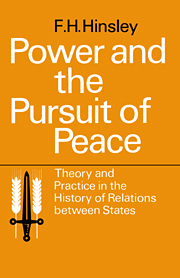Book contents
- Frontmatter
- Contents
- INTRODUCTION
- PART I A HISTORY OF INTERNATIONALIST THEORIES
- 1 To the End of the Seventeenth Century
- 2 Penn, Bellers and Saint-Pierre
- 3 Rousseau
- 4 Kant
- 5 Bentham and James Mill
- 6 The First Half of the Nineteenth Century
- 7 From the Crimean War to the League of Nations
- PART II A HISTORY OF THE MODERN STATES' SYSTEM TO 1900
- PART III INTERNATIONAL RELATIONS AND INTERNATIONAL ORGANIZATIONS IN THE TWENTIETH CENTURY
- References
- Index
6 - The First Half of the Nineteenth Century
Published online by Cambridge University Press: 11 January 2010
- Frontmatter
- Contents
- INTRODUCTION
- PART I A HISTORY OF INTERNATIONALIST THEORIES
- 1 To the End of the Seventeenth Century
- 2 Penn, Bellers and Saint-Pierre
- 3 Rousseau
- 4 Kant
- 5 Bentham and James Mill
- 6 The First Half of the Nineteenth Century
- 7 From the Crimean War to the League of Nations
- PART II A HISTORY OF THE MODERN STATES' SYSTEM TO 1900
- PART III INTERNATIONAL RELATIONS AND INTERNATIONAL ORGANIZATIONS IN THE TWENTIETH CENTURY
- References
- Index
Summary
It was the attitude of Bentham and Mill―the belief that ‘between the interests of nations there is nowhere any real conflict’ and that international law could at once be set up and work successfully, not Rousseau's ultimate conviction that international conflict made progress impossible nor Kant's conclusion that only by means of international conflict would progress be achieved―that dominated men's attitude to this problem in the first half of the nineteenth century. The characteristic, not to say the universal, beliefs of these years were those which Bentham had deduced from the argument that the constitutional state, regarded by Kant as a necessary condition of international peace, was, rather, the sufficient guarantee of it: the grounds for war had almost disappeared among the civilised nations; in so far as war still persisted between them it was due to the stupidity and criminality of existing governments; international organisation as a safeguard against war was undesirable because existing governments could not be trusted; it was also unnecessary because the reform of governments would itself ensure peace by releasing reason and establishing the benevolent sway of public opinion and international law.
These opinions were Bible, first, to all who welcomed the French Revolution. Tom Paine was speaking for all such men when he wrote in the Rights of Man (1791) that ‘Monarchical sovereignty, the enemy of mankind and the source of misery, is abolished, and sovereignty is restored to its natural and original place, the nation.’
- Type
- Chapter
- Information
- Power and the Pursuit of Peace: Theory and Practice in the History of Relations Between States , pp. 92 - 113Publisher: Cambridge University PressPrint publication year: 1962



